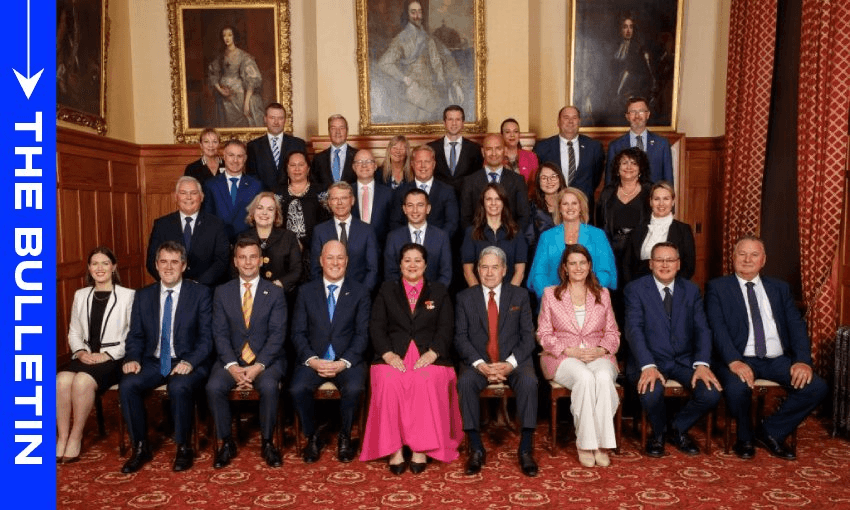Over 30 initiatives, projects and pieces of legislation look set to be torched as the new government moves on from the ceremonial and into its 100-day plan and pledge to ‘fix the economy’, writes Anna Rawhiti-Connell in this excerpt from The Bulletin, The Spinoff’s morning news round-up. To receive The Bulletin in full each weekday, sign up here.
One last ‘ceremonial’ occasion
Having set itself a full agenda, much of it time-bound by the campaign accoutrement of the 100-day plan and deadlines within the coalition agreements, the new government doesn’t get much time to bask in the ceremonial. Reporting from yesterday’s swearing-in of new ministers at Government House in Wellington, Joel MacManus notes that even the piano player banged out the national anthem in great haste. Cabinet will meet today for the first time, but that will be the last time it stands on ceremony for a while, pending the “speech from the throne” when parliament sits next week. Today’s cabinet meeting is really just a photo opportunity more than anything. Prime Minister Christopher Luxon says the work to get the 100-day plan approved will begin on Wednesday. Don’t ask me when the clock actually starts on those 100 days, given it was meant to start yesterday. Time is a construct. There are nine scheduled sitting days left until the House rises.
Everything consigned to the scrapheap
Just as we began the year with the bonfire of the policies, so too will we end it. As Toby Manhire details this morning, the new government’s approach to the last government’s legacy is to set it alight, with over 30 pieces of legislation, projects and initiatives set to be torched. Fair pay agreements are set to be gone by Christmas, according to the National-Act coalition deal. Council of Trade Unions president Richard Wagstaff said it would be a “backward step” to remove the work standards included in the fair pay agreements. Business NZ chief executive Kirk Hope said some fair pay agreements had not been put into place and should be ditched. “They’re probably not going to help workers in any meaningful way,” he said.
RMA reform gone by Christmas
The National-Act coalition deal also stipulates that the legislation enabling the Resource Management Act reform, the Natural and Built Environment Act 2023 and the Spatial Planning Act 2023 must be repealed by Christmas. As RNZ’s Anneke Smith reports, Environmental Defence Society chief executive Gary Taylor says, “What’s been produced can’t be 100 percent bad. They’re throwing the baby out with the bath water. I would have preferred them to panel beat that law into their preferred shape.” New minister for regulation, David Seymour, has volunteered the services of a new yet-to-be-established government department, partially funded by disestablishing the Productivity Commission, to help with the task. In an assessment of the new government’s “war on woke” (paywalled), the Herald’s Simon Wilson labels Seymour’s new turf, “the ministry of silly regulations”. “Yes, it is Monty Pythonesque,” he writes. As Politik’s Richard Harman notes (paywalled), “Regulations, generally, are the product of a piece of primary legislation which is the property of a particular minister. Ministers may react adversely to Seymour poking his nose into what they might regard as their own business.” Chris Bishop is the minister responsible for RMA reform.
‘Fixing the economy’ is the priority
Christopher Luxon pledged to trim 6.5% of savings from the public service after he was sworn in as prime minister. Finance minister Nicola Willis has already alluded to some “nasty surprises” left by the outgoing Labour government in the form of “pretty significant” fiscal risks. Blaming past governments may hold some sway as a line oft’ repeated in the debating chamber, but when the election was fought along cost of living lines, the blame game will get very tired very quickly. In an excellent assessment and analysis of the arithmetic (paywalled) required to make the promised tax cuts work, the Herald’s Thomas Coughlan writes, “the Herald has found that the post-election changes to National’s fiscal plan will raise additional revenue of about $3b – enough to cover the cost of dumping the foreign buyers’ ban, but not enough to cover whatever the cost of accelerating interest deductions [for residential landlords] might be.” He also notes that the policy that will hit families the hardest is a plan to freeze the Working for Families abatement threshold at $42,700. It’s been at that threshold since 2018. “The real sum of this bleak arithmetic is an impossible choice between more borrowing, more tax, or more broken promises,” he writes.


